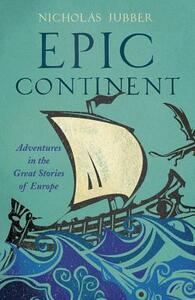Take a photo of a barcode or cover
A fascinating journey across Europe from the site of one epic poem to another, starting in Greece with The Odyssey, then to The Kosovo Cycle, The Song of Roland, The Nibelungenlied, Beowulf, and ending in Iceland with Njal's Saga. I learned a lot of European history, filled in some literary gaps, and thoroughly enjoyed the style of the author. I read with my iPhone dictionary close at hand and jotted down a couple dozen new-to-me words, plus some wonderful turns of phrase.
adventurous
informative
medium-paced
A fantastic premise that actually turns out to be a piecemeal glance at various European epic tales.
There is not enough sense of place, and it’s often hard to see the full significance of the places visited.
The book relies on being read with companion books that actually explain the epic stories that are referenced.
For me, the greatest disappointment was the writing. An attempt to be romantic or at least lyrical comes across as laboured. And, frankly, tiresome: it’s like reading the unedited work of an enthusiastic sixth form poet.
There is not enough sense of place, and it’s often hard to see the full significance of the places visited.
The book relies on being read with companion books that actually explain the epic stories that are referenced.
For me, the greatest disappointment was the writing. An attempt to be romantic or at least lyrical comes across as laboured. And, frankly, tiresome: it’s like reading the unedited work of an enthusiastic sixth form poet.
adventurous
hopeful
reflective
sad
fast-paced
Nicholas Jubber takes the reader along on an epic trans-continental journey through Europe. This book presents itself as a trip through the real life locations of The Odyssey, The Kosovo Cycle, The Song of Roland, The Nibelungenlied, Beowulf and Njal's Saga. In actual fact it is a journey through modern day Europe in all its nuanced reality. The book is particularly strong where the author describes the realities of immigration, the perils of grief and the visceral experience of hiking in the wilds of Europe.
adventurous
informative
inspiring
medium-paced
Interesting attempt to connect the past upheavals in Europe that led to the epic poems he follows to the modern issues facing the continent.
adventurous
informative
reflective
medium-paced
adventurous
funny
informative
inspiring
medium-paced
Minor: Animal death, Child death, Death, Genocide, Misogyny, Violence, Xenophobia, Blood, Antisemitism, Islamophobia, Grief, Death of parent, Murder, Fire/Fire injury, Alcohol, War
Epic Continent is a literary travelogue that charts the locations, history, and reception of six European epics. Focusing on change, war, and dominant narratives, these stories often span locations and Jubber travels across Europe, from Greece and Turkey of the Odyssey to Iceland for the Saga of Burnt Njal, to follow their progress. They are all major works—most will be familiar in name if not content, especially Beowulf, the Odyssey, and Song of Roland—and the focus is on major moments in history and important landscapes. At the same time, there is a lot of focus on modern Europe, on the refugee crisis and unity; Jubber meets a lot of refugees on his journey and also notices how similar tensions are found in the epics themselves.
The mix of travel with literature and history is an interesting one, feeling similar to other writers who combine specific journeys to find the locations of things and stories with descriptions of the people they meet there and their own reactions. The personal—from the lives of the refugees Jubber meets to a continuing theme of grief and dealing with it—is surprisingly present in a book about travelling through the great epics. Much of these stories' reception history is tinged with the same violence, conflict, and ideological problems as occurs in the stories themselves (most obviously the Nibelungenlied and the Kosovo Cycle) and Jubber tries to highlight this, though it is clear he would need more space to fully explore the issues. Instead, the book has to pass through a lot of material in a short space, fitting six epics into one book.
It is likely that Epic Continent will draw in people interested in the epic works, but what is perhaps most notable is the way Jubber's travels through their locations and history give space to reflect on modern Europe and its divisions and problems. In some ways it is a manifesto for cross-border stories and a shared epic tradition, even though the history and content of these is not straightforwardly good.
The mix of travel with literature and history is an interesting one, feeling similar to other writers who combine specific journeys to find the locations of things and stories with descriptions of the people they meet there and their own reactions. The personal—from the lives of the refugees Jubber meets to a continuing theme of grief and dealing with it—is surprisingly present in a book about travelling through the great epics. Much of these stories' reception history is tinged with the same violence, conflict, and ideological problems as occurs in the stories themselves (most obviously the Nibelungenlied and the Kosovo Cycle) and Jubber tries to highlight this, though it is clear he would need more space to fully explore the issues. Instead, the book has to pass through a lot of material in a short space, fitting six epics into one book.
It is likely that Epic Continent will draw in people interested in the epic works, but what is perhaps most notable is the way Jubber's travels through their locations and history give space to reflect on modern Europe and its divisions and problems. In some ways it is a manifesto for cross-border stories and a shared epic tradition, even though the history and content of these is not straightforwardly good.


